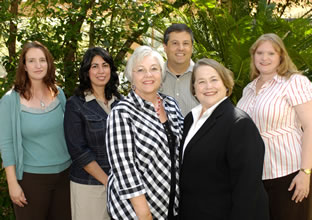UTSA Late Intervention program wins Higher Ed. Coordinating Board award

From left to right are UTSA Graduation Initiative program staff Jinny Case, Diane Elizondo, Linda Chalmers, Clinton Rodenfels, Patricia Glenn and Kristi Meyer.

From left to right are UTSA Graduation Initiative program staff Jinny Case, Diane Elizondo, Linda Chalmers, Clinton Rodenfels, Patricia Glenn and Kristi Meyer.
(Jan. 20, 2010)--The UTSA Graduation Initiative's Late Intervention program recently was honored by the Texas Higher Education Coordinating Board (THECB) with a 2009 Star Award. The program was one of six honored from a pool of 51 nominations and 13 finalists.
Conceived and implemented by the UTSA Graduation Initiative, the Late Intervention program targets students who have exceeded four years in working toward graduation. The initiative will help these students resolve financial barriers to earning a bachelor's degree within five to six years. The program supports university and state "Closing the Gap" goals, aimed at improving the overall graduation rate of Texas undergraduates.
Through the program, UTSA targets students who are near graduation after four years of study. To help those students graduate, the initiative provides them with one or more $2,000 scholarships to help facilitate their graduations.
"At UTSA, we want our students to succeed. We want them to graduate and transition into the profession of their choice," said Clinton Rodenfels, director of the UTSA Graduation Initiative. "That's why we've developed a number of programs to facilitate graduation and retention. Now that our Late Intervention program has been in place for a number of years, we're finding that all it takes is a little push to help many of our students complete the requirements necessary to earn their degrees and change their lives."
Both Maime Witt and Emiliano Morales credit the Late Intervention program with supporting them in the completion of their bachelor's degrees.
"I received an e-mail saying, 'You've been selected to participate in this program,' and they offered me $2,000 per semester if I could complete my degree before summer 2010," said Witt. "I still had to attend field camp -- a requirement for all geology majors -- and the first scholarship that I received helped fund my travel expenses."
In December, she crossed the graduation stage and relocated to Houston, where she is looking for a job in petroleum exploration. She plans to attend graduate school next fall.
Likewise, the Late Intervention program helped speed up graduation for Emiliano Morales, who earned his bachelor's degree in electrical engineering last month.
"I worked during my first four years at UTSA and during my fifth, I held a work-study job in the admissions office, which was much more flexible," Morales said. "When UTSA gave me two $2,000 scholarships -- one for the summer 2009 semester and one for the fall 2009 semester -- it allowed me to register for summer classes and finish up my degree in the fall. Now, I'm enrolled in the electrical engineering master's degree program at UTSA."
Since the program began in early 2007, participation has increased each year and participants have consistently graduated at a higher rate than non-participating students. More than 73 percent of the Late Intervention students from the 2001 cohort graduated within six years, compared to 30 percent of similar, non-participating peers. In 2002, more than 86 percent of Late Intervention students graduated within six years, compared to 40.1 percent of similar non-participating peers.
The Texas Higher Education Star Award was established by the THECB in 2001 to recognize institutions of higher education, school districts, schools, organizations and individuals who have made exceptional contributions to one or more of the goals of Closing the Gaps by 2015; the plan aims to increase the number of students participating, student success, academic excellence and research in Texas.
Events
The UTSA Office of Undergraduate is proud to celebrate National Undergraduate Research with an annual event sponsored by the (OUR) featuring students will showcase undergraduate student research and creative endeavors from all disciplines across campus.
Various LocationsDía en la Sombrilla, formerly Fiesta UTSA, is a festival hosted each spring as a part of Fiesta® San Antonio events. Sponsored by Roadrunner Productions, the event features music, food, confetti, games, event t-shirts, and more.
Sombrilla Plaza and Central Plaza, Main CampusFiesta Arts Fair features contemporary art from more than 100 artists from across the U.S., Fiesta favorite foods, drinks, live music by local and regional performers, and a Young Artists Garden providing opportunities for budding artists to learn, explore and express their creativity.
UTSA Southwest CampusJoin the PEACE Center and Wellbeing Services for Denim Day, a day of learning about the importance of consent and why we wear denim on the last Wednesday of the month each April during Sexual Assault Awareness Month. Stop by our Denim Day display to take a photo in front of our Denim Wall, spin the "Is It Consent?" Wheel, and get a Concha or goodie.
Student Union Window Lounge, Main CampusLearn to use Zotero®, a citation manager that can help you store and organize citations you find during your research. Zotero can generate bibliographies in various styles, insert in-text citations and allow you to share sources with collaborators.
Virtual EventThis event is to achnowlege the graduating seniors and induct the new cohart of scholars to our program.
North Paseo Building (NPB 5.140,) Main CampusCelebrate the accomplishments of College of Education and Human Development, College for Health, Community and Policy, College of Sciences and University College.
Alamodome

